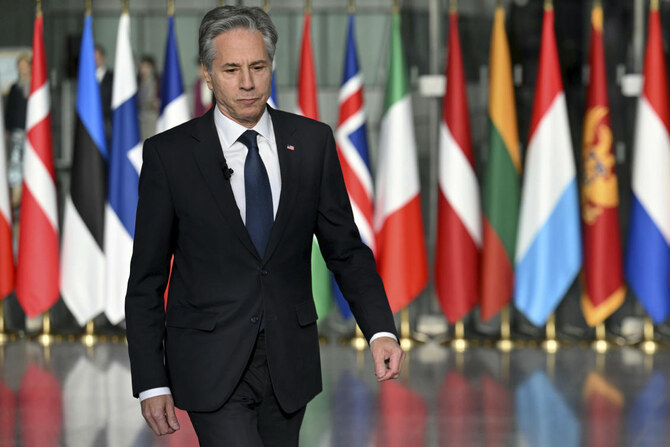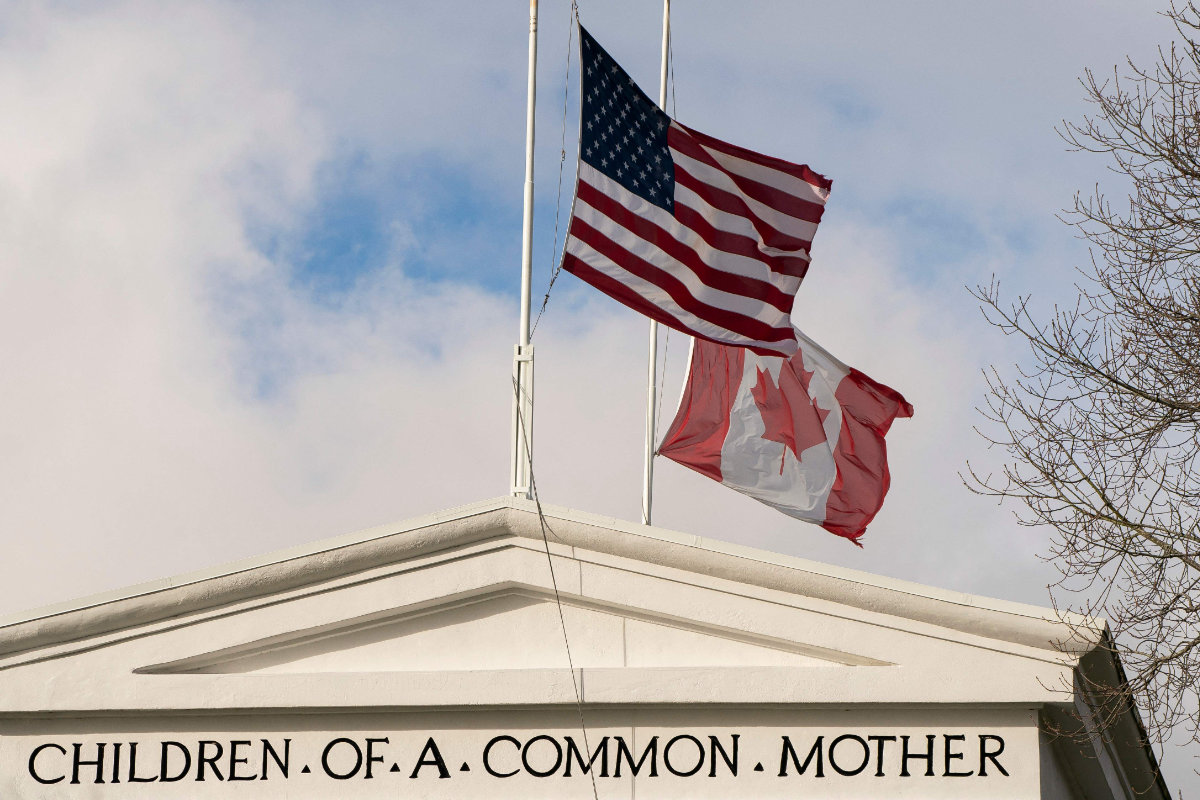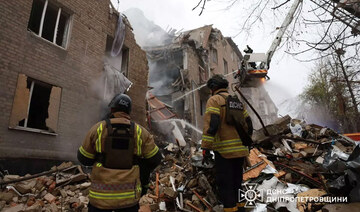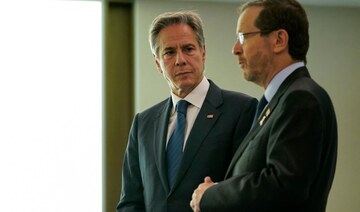KYIV: The Biden administration is determined in its final months to help ensure that Ukraine can keep fighting off Russia’s full-scale invasion next year, sending it as much aid as possible so that it might hold Russian forces at bay and possess a strong hand in any potential peace negotiations, US Secretary of State Antony Blinken said Wednesday.
“President Biden has committed to making sure that every dollar we have at our disposal will be pushed out the door between now and Jan. 20,” when president-elect Donald Trump is due to be sworn in, Blinken said.
NATO countries must focus their efforts on “ensuring that Ukraine has the money, munitions and mobilized forces to fight effectively in 2025, or to be able to negotiate a peace from a position of strength,” Blinken said during a visit to Brussels.
The US will “adapt and adjust” with the latest equipment it is sending, Blinken said, without providing details.
The almost three-year war has shown no signs of winding down.
Russia attacked the Ukrainian capital Kyiv with a sophisticated combination of missiles and drones for the first time in 73 days on Wednesday. That came a day after the Pentagon said most of the North Korean troops sent to help Moscow’s war effort are fighting to drive Ukraine’s army off Russian soil in the Kursk border region.
Ukraine is also straining to hold back a monthslong Russian onslaught in the eastern Donetsk region.
Political uncertainty over how a US administration under Trump will change Washington’s policy on the war is a key new factor in the conflict. US military aid is vital for Ukraine, but Trump has signaled that he doesn’t want to keep giving tens of billions of dollars to Kyiv.
Air raid warnings blared for hours as Russia targeted eight regions of Ukraine on Wednesday, firing six ballistic and cruise missiles and 90 drones, the Ukrainian air force said.
Air defenses downed four missiles and 37 drones, and another 47 drones were stopped by electronic jamming, the statement said. The damage was being assessed.
The air assault came as most of the more than 10,000 North Korean troops sent by Pyongyang to help Moscow in the war are engaged in combat in Russia’s Kursk border region, according to the Pentagon. A Ukrainian army incursion into Kursk three months ago has succeeded in holding a broad area of land and has embarrassed the Kremlin.
Russia’s military has trained the North Korean soldiers in artillery, drone skills and basic infantry operations, including trench clearing, Pentagon deputy spokesperson Vedant Patel told a briefing Tuesday. The cooperation faces challenges, according to the Pentagon, including how to achieve military interoperability and overcoming the language barrier.
Kyiv officials say that Russia has deployed around 50,000 troops to Kursk in a bid to dislodge the Ukrainians.
Russia has in recent months been assembling forces for a counteroffensive in Kursk, according to the Institute for the Study of War think tank, though the timescale of the operation isn’t known.
Biden is sending aid to help Ukraine keep fighting next year, Blinken says
https://arab.news/m8mbj
Biden is sending aid to help Ukraine keep fighting next year, Blinken says

- “President Biden has committed to making sure that every dollar we have at our disposal will be pushed out the door between now and Jan. 20,” Blinken said
- The US will “adapt and adjust” with the latest equipment it is sending, Blinken said, without providing details
Canada announces retaliatory measures against Trump tariffs; China also vows ‘countermeasures’

- Trump placed duties of 10 percent on all imports from China, 25 percent on imports from Mexico and Canada
- Says decision necessary “to protect Americans,” although it could throw global economy into possible turmoil
OTTAWA: Canada’s Prime Minister Justin Trudeau said on Saturday Canada would impose 25 percent tariffs on C$155 billion ($106.5 billion) of US goods in response to tariffs imposed by US President Donald Trump.
C$30 billion would take effect from Tuesday and C$125 billion in 21 days, Trudeau told a news conference.
China also said it “firmly opposes” the new tariffs imposed on Beijing and vowed to take “corresponding countermeasures to resolutely safeguard our own rights and interests.”
Trump earlier signed an executive order imposing 25 percent tariffs on all goods from Canada and Mexico starting on Tuesday except Canadian energy products, which will be subject to a 10 percent duty.
Trudeau warned the tariffs would hurt the United States, a long-time ally. He encouraged Canadians to buy Canadian products and vacation at home rather than in the US.
He said some non-tariff measures, including some relating to critical minerals, energy procurement and other partnerships are being looked at.
Trump also unveiled sweeping measures against China, announcing an additional 10 percent tariff on Chinese imports on top of existing duties.
In a statement on Sunday, China’s commerce ministry slammed Washington’s “erroneous practices,” saying Beijing was “strongly dissatisfied with this and firmly opposes it.”
The ministry said Beijing would file a lawsuit at the World Trade Organization, arguing that “the unilateral imposition of tariffs by the United States seriously violates WTO rules.”
It added that the duties were “not only unhelpful in solving the US’s own problems, but also undermine normal economic and trade cooperation.”
“China hopes that the United States will objectively and rationally view and deal with its own issues like fentanyl, rather than threatening other countries with tariffs at every turn,” the ministry said.
It said Beijing “urges the US to correct its erroneous practices, meet China halfway, face up to its problems, have frank dialogues, strengthen cooperation and manage differences on the basis of equality, mutual benefit and mutual respect.”
Canada announces retaliatory measures against Trump tariffs; China also vows ‘countermeasures’

- Canada would impose 25 percent tariffs on C$155 billion ($106.5 billion) of US goods, PM Trudeau says
- China says the duties were “not only unhelpful in solving the US’s own problems, but also undermine normal economic and trade cooperation”
OTTAWA: Canada’s Prime Minister Justin Trudeau said on Saturday Canada would impose 25 percent tariffs on C$155 billion ($106.5 billion) of US goods in response to tariffs imposed by US President Donald Trump.
C$30 billion would take effect from Tuesday and C$125 billion in 21 days, Trudeau told a news conference.
China also said it “firmly opposes” the new tariffs imposed on Beijing and vowed to take “corresponding countermeasures to resolutely safeguard our own rights and interests.”
Trump earlier signed an executive order imposing 25 percent tariffs on all goods from Canada and Mexico starting on Tuesday except Canadian energy products, which will be subject to a 10 percent duty.
Trudeau warned the tariffs would hurt the United States, a long-time ally. He encouraged Canadians to buy Canadian products and vacation at home rather than in the US.
He said some non-tariff measures, including some relating to critical minerals, energy procurement and other partnerships are being looked at.
Trump also unveiled sweeping measures against China, announcing an additional 10 percent tariff on Chinese imports on top of existing duties.
In a statement on Sunday, China’s commerce ministry slammed Washington’s “erroneous practices,” saying Beijing was “strongly dissatisfied with this and firmly opposes it.”
The ministry said Beijing would file a lawsuit at the World Trade Organization, arguing that “the unilateral imposition of tariffs by the United States seriously violates WTO rules.”
It added that the duties were “not only unhelpful in solving the US’s own problems, but also undermine normal economic and trade cooperation.”
“China hopes that the United States will objectively and rationally view and deal with its own issues like fentanyl, rather than threatening other countries with tariffs at every turn,” the ministry said.
It said Beijing “urges the US to correct its erroneous practices, meet China halfway, face up to its problems, have frank dialogues, strengthen cooperation and manage differences on the basis of equality, mutual benefit and mutual respect.”
Zelensky says excluding Ukraine from US-Russia talks about war is ‘very dangerous’

- Zelensky’s remarks followed comments Friday by Trump, who said American and Russian officials were “already talking” about ending the war
- Without security guarantees from Ukraine’s allies, Zelensky said, any deal struck with Russia would only serve as a precursor to future aggression
KYIV, Ukraine: Ukrainian President Volodymyr Zelensky said Saturday that excluding his country from talks between the US and Russia about the war in Ukraine would be “very dangerous” and asked for more discussions between Kyiv and Washington to develop a plan for a ceasefire.
Speaking in an exclusive interview with The Associated Press, Zelensky said Russia does not want to engage in ceasefire talks or to discuss any kind of concessions, which the Kremlin interprets as losing at a time when its troops have the upper hand on the battlefield.
He said US President Donald Trump could bring Russian President Vladimir Putin to the table with the threat of sanctions targeting Russia’s energy and banking system, as well as continued support of the Ukrainian military.
“I think these are the closest and most important steps,” he said in the interview in the Ukrainian capital that lasted for more than an hour.
Zelensky’s remarks followed comments Friday by Trump, who said American and Russian officials were “already talking” about ending the war. Trump said his administration has had “very serious” discussions with Russia, but he did not elaborate.
“They may have their own relations, but talking about Ukraine without us — it is dangerous for everyone,” Zelensky said.
He said his team has been in contact with the Trump administration, but those discussions are at a “general level,” and he believes in-person meetings will take place soon to develop more detailed agreements.
“We need to work more on this,” he said, adding that Trump understandably appeared to be focused on domestic issues in the first weeks after his inauguration.
The nearly three-year war in Ukraine is at a crossroads. Trump promised to end the fighting within six months of taking office, but the two sides are far apart, and it is unclear how a ceasefire deal would take shape. Meanwhile, Russia continues to make slow but steady gains along the front, and Ukrainian forces are enduring severe manpower shortages.
Most Ukrainians want a pause in fighting to rebuild their lives. The country faces near-daily Russian attacks on homes, and strikes on power systems have plunged entire cities into darkness.
Millions of Ukrainians have been displaced, unable to return to their homes after vast tracts of the country’s east have been reduced to rubble. Nearly a fifth of Ukraine is now occupied by Russia. In those areas, Moscow-appointed authorities are swiftly erasing any hint of Ukrainian identity.
With Trump back in the White House, Ukraine’s relationship with the US, its largest and most important ally, is also at a tipping point.
In an initial phone call with Trump during the presidential campaign, Zelensky said, the two agreed that if Trump won, they would meet to discuss the steps needed to end the war. But a planned visit by Trump’s Ukraine envoy, Keith Kellogg, was postponed “for legal reasons” Zelensky said. That was followed by a sudden foreign aid freeze that effectively caused Ukrainian organizations to halt projects.
“I believe that, first and foremost, we (must) hold a meeting with him, and that is important. And that is, by the way, something that everyone in Europe wants,” Zelensky said, referring to “a common vision of a quick end to the war.”
After the conversation with Trump, “we should move on to some kind of format of conversation with Russians. And I would like to see the United States of America, Ukraine and the Russians at the negotiating table. ... And, to be honest, a European Union voice should also be there. I think it would be fair, effective. But how will it turn out? I don’t know.”
Zelensky cautioned against allowing Putin to take “control” over the war, an apparent reference to Russia’s repeated threats of escalation during President Joe Biden’s administration.
Without security guarantees from Ukraine’s allies, Zelensky said, any deal struck with Russia would only serve as a precursor to future aggression. Membership in the NATO alliance, a longstanding wish for Kyiv that Moscow has categorically rejected, is still Zelensky’s top choice.
NATO membership is the “cheapest” option for Ukraine’s allies, and it would also strengthen Trump geopolitically, Zelensky argued.
“I really believe that these are the cheapest security guarantees that Ukraine can get, the cheapest for everyone,” he said.
“It will be a signal that it is not for Russia to decide who should be in NATO and who should not, but for the United States of America to decide. I think this is a great victory for Trump,” he said, evidently appealing to the president’s penchant for winners and business deals.
In addition, Zelensky said, Ukraine’s 800,000-strong army would be a bonus to the alliance, especially if Trump seeks to bring home US troops who are stationed overseas.
Other security guarantee proposals should be backed up by sufficient weapons from the US and Europe, and support for Kyiv to develop its own defense industry, he said.
Zelensky also said a French proposal to put European forces in Ukraine to act as a deterrent against Russian aggression is taking shape, but he expressed skepticism, saying many questions remained about the command-and-control structure and the number of troops and their positions. The issue was raised by French President Emmanuel Macron and with Trump, he said.
“I said in the presence of the two leaders that we are interested in this as a part of the security guarantee, but not as the only guarantee of safety,” he said. “That’s not enough.”
He added: “Imagine, there is a contingent. The question is who is in charge? Who is the main one? What will they do if there are Russian strikes? Missiles, disembarkation, attack from the sea, crossing of the land borderline, offensive. What will they do? What are their mandates?”
Asked if he put those questions directly to Macron, he smiled and said: “We are still in the process of this dialogue.”
Following a statement by US Secretary of State Marco Rubio that the war has set Ukraine back by 100 years, Zelensky urged Rubio to visit Ukraine.
Rubio “needs to come to Ukraine, first of all, to see what Russia has done,” the Ukrainian president said. “But also to see what the Ukrainian people did, what they were able to do for the security of Ukraine and the world, as I said, and just talk to these people.”
Trump imposes tariffs on Canada, Mexico and China, raising prospect of inflation and trade conflict

- Trump declared an economic emergency in order to place duties of 10 percent on all imports from China and 25 percent on imports from Mexico and Canada
- Trump said his decision was necessary “to protect Americans,” although it could throw the global economy and his own political mandate to combat inflation into possible turmoil
PALM BEACH, Florida: President Donald Trump on Saturday signed an order to impose stiff tariffs on imports from Mexico, Canada and China — fulfilling one of his post-campaign commitments to voters that also carries the risk of sparking higher inflation and disrupting businesses across North America.
Trump’s order also includes a mechanism to escalate the rates if the countries retaliate against the US, as they are possibly prepared to do.
The decision throws the global economy and Trump’s own political mandate to combat inflation into possible turmoil, though the Republican president posted on social media that it was necessary “to protect Americans.”
The tariffs risk an economic standoff with America’s two largest trading partners in Mexico and Canada, upending a decades-old trade relationship with the possibility of harsh reprisals by those two nations. The tariffs also if sustained could cause inflation to significantly worsen, possibly eroding voters’ trust that Trump could as promised lower the prices of groceries, gasoline, housing, autos and other goods.
Trump declared an economic emergency in order to place duties of 10 percent on all imports from China and 25 percent on imports from Mexico and Canada. But energy imported from Canada, including oil, natural gas and electricity, would be taxed at a 10 percent rate.
The tariffs would go into effect on Tuesday, setting a showdown in North America that could potentially sabotage economic growth. A new analysis by the Budget Lab at Yale laid out the possible damage to the US economy, saying the average US household would lose the equivalent of $1,170 in income from the taxes. Economic growth would slow and inflation would worsen — and the situation could be worse if Canada, Mexico and China retaliate.
For the moment, Mexico plans to stay cool-headed as it weighs its options.
Mexico President Claudia Sheinbaum, appearing Saturday at an event promoting a government housing program outside Mexico City said, “I’m calm, I’ve been saying since yesterday, because I know that Mexico’s economy is very powerful, very strong.”
A senior administration official, insisting on anonymity to brief reporters, said the lower rate on energy reflected a desire to minimize any disruptive increases on the price of gasoline or utilities. That’s a sign White House officials understand the gamble they’re taking on inflation. Price spikes under former President Joe Biden led to voter frustration that helped to return Trump to the White House last year.
The order signed by Trump contained no mechanism for granting exceptions, the official said, a possible blow to homebuilders who rely on Canadian lumber as well as farmers, automakers and other industries.
The Trump administration put the tariffs in place to force the three countries to stop the spread and manufacturing of fentanyl, in addition to pressuring Canada and Mexico to limit any illegal immigration into the United States.

The official did not provide specific benchmarks that could be met to lift the new tariffs, saying only that the best measure would be fewer Americans dying from fentanyl addiction.
The order would also allow for tariffs on Canadian imports of less than $800. Imports below that sum are currently able to cross into the United States without customs and duties.
“It doesn’t make much economic sense,’’ said William Reinsch, senior adviser at the Center for Strategic and International Studies and a former US trade official. “Historically, most of our tariffs on raw materials have been low because we want to get cheaper materials so our manufacturers will be competitive ... Now, what’s he talking about? He’s talking about tariffs on raw materials. I don’t get the economics of it.’’
The Republican president is making a major political bet that his actions will not significantly worsen inflation, cause financial aftershocks that could destabilize the worldwide economy or provoke a voter backlash. AP VoteCast, an extensive survey of the electorate in last year’s election, found that the US was split on support for tariffs.
With the tariffs, Trump is honoring promises that are at the core of his economic and national security philosophy. But the announcement showed his seriousness around the issue as some Trump allies had played down the threat of higher import taxes as mere negotiating tactics.
The president is preparing more import taxes in a sign that tariffs will be an ongoing part of his second term. On Friday, he mentioned imported computer chips, steel, oil and natural gas, as well as against copper, pharmaceutical drugs and imports from the European Union — moves that could essentially pit the US against much of the global economy.
It is unclear how the tariffs could affect the business investments that Trump said would happen because of his plans to cut corporate tax rates and remove regulations. Tariffs tend to raise prices for consumers and businesses by making it more expensive to bring in foreign goods.

Many voters turned to Trump in the November election on the belief that he could better handle the inflation that spiked under Biden. But inflation expectations are creeping upward in the University of Michigan’s index of consumer sentiment as respondents expect prices to rise by 3.3 percent. That would be higher than the actual 2.9 percent annual inflation rate in December’s consumer price index.
Trump has said that the government should raise more of its revenues from tariffs, as it did before the income tax became part of the Constitution in 1913. He claims, despite economic evidence to the contrary, that the US was at its wealthiest in the 1890s under President William McKinley.
“We were the richest country in the world,” Trump said Friday. “We were a tariff country.”
Canadian Prime Minister Justin Trudeau has told Canadians that they could be facing difficult times ahead, but that Ottawa was prepared to respond with retaliatory tariffs if needed and that the US penalties would be self-sabotaging.
Trudeau said Canada is addressing Trump’s calls on border security by implementing a CDN$1.3 billion ($900 million) border plan that includes helicopters, new canine teams and imaging tools.
Trump still has to get a budget, tax cuts and an increase to the government’s legal borrowing authority through Congress. The outcome of his tariff plans could strengthen his hand or weaken it.
Democrats were quick to say that any inflation going forward was the result of Trump, who is about to start his third week back as president.
“You’re worried about grocery prices. Don’s raising prices with his tariffs,” Senate Democratic Leader Chuck Schumer of New York posted on X. “You’re worried about tomato prices. Wait till Trump’s Mexico tariffs raise your tomato prices. … You’re worried about car prices. Wait till Trump’s Canada tariffs raise your car prices,” he wrote in a series of posts.
US Democrats anoint new leader to take on Trump for ‘working people’

- Much of Democratic success going forward will be in how the party presents itself to an American public weary of politics
NATIONAL HARBOR, United States: US Democrats picked a 51-year-old progressive activist on Saturday as their new leader, who must rebuild a party still reeling from last year’s crushing presidential defeat — and figure out how best to oppose Republican Donald Trump.
“The Democratic Party is the party of working people, and it’s time to roll up our sleeves and outcompete everywhere, in every election, and at every level of government,” Ken Martin, the new chairman of the Democratic National Committee (DNC), said in a statement.
The DNC, the party’s governing body, raises millions of dollars each year to support and build infrastructure for candidates across the country, culminating every four years in the presidential election.
Martin, a relative unknown outside of the party, stressed the need for Democrats to reconnect with blue collar voters, and to take the electoral fight to all 50 states — even bastions of conservative politics.
“Donald Trump and his billionaire allies are put on notice — we will hold them accountable for ripping off working families, and we will beat them at the ballot box,” Martin said.
Party grandees were meeting near Washington as the DNC carries out a postmortem of their November loss.
They elevated Martin, formerly the chair of the party’s Minnesota branch, to devise their national battle plan.
“This is not a game of chess where everyone is moving their pieces back and forth in a respectful, timed manner. This is guerilla warfare in political form,” said Katherine Jeanes, deputy digital director of the North Carolina Democratic Party, ahead of the vote.
Maryland Governor Wes Moore, a rising Democratic star, warned that the party must “not to go into hiding until the next general election.”
The moment calls for boldness, added Shasti Conrad, chair of the party’s Washington state branch, saying that many Americans have lost the faith.
“They don’t trust us to be able to make things better. They don’t trust that when we are given power, that we know how to use it,” Conrad said.
And the fight starts now, she added — there can be no waiting until the next presidential election, set for 2028.
Facing a Republican majority in Congress and a second term for Trump, who has roared back into the White House with all the provocative rhetoric of his first administration, Democrats say they must pick their battles.
“We have to be able to decipher crazy rhetoric versus policy violence,” said Conrad, and not be like a “dog chasing the car.”
While many are “exhausted” after the last election campaign, Jeanes said the party must learn to respond to the frantic pace of shock moves from the Trump administration.
Much of Democratic success going forward will be in how the party presents itself to an American public weary of politics.
That includes engaging with voters “in places that have sometimes been uncomfortable” for Democrats, according to Conrad.
After his victory in November, Trump credited a series of interviews on largely right-wing podcasts, including the popular “Joe Rogan Experience,” for aiding his return to the White House.
“We need to be getting on sports podcasts and video games and trying to make sure that we’re reaching into apolitical spaces,” Jeanes said.




















